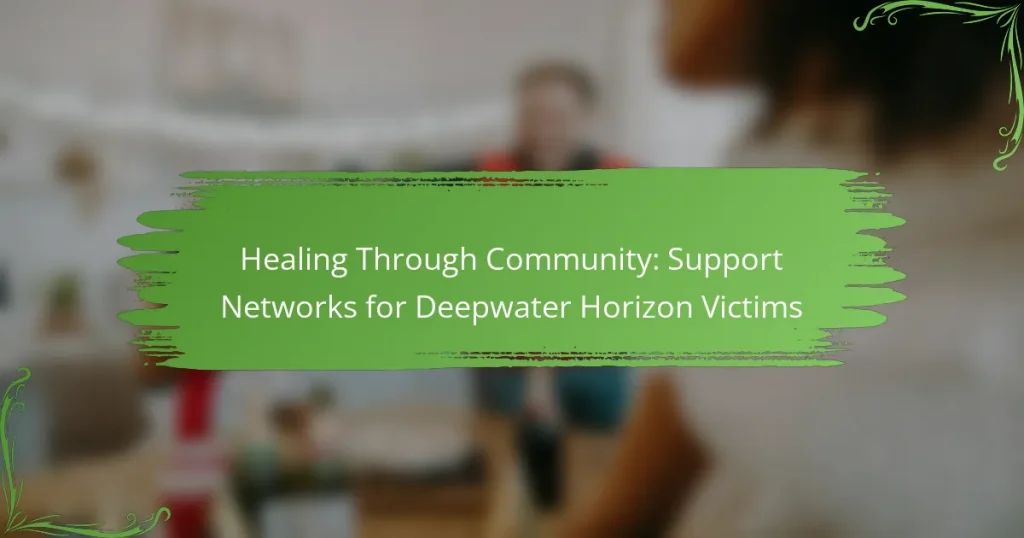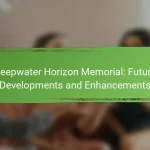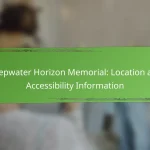Healing Through Community for Deepwater Horizon Victims is a support initiative designed to assist individuals impacted by the 2010 oil spill. This program highlights the role of community connections in promoting recovery, offering emotional support, resources, and shared experiences that facilitate coping with trauma. Research supports that community engagement enhances resilience and mental health among victims. Various support networks, including community organizations, legal aid groups, and mental health services, collaborate to meet the diverse needs of those affected. The initiative encourages individual contributions to community healing through volunteering, donations, and advocacy, emphasizing the importance of collective efforts in the recovery process.
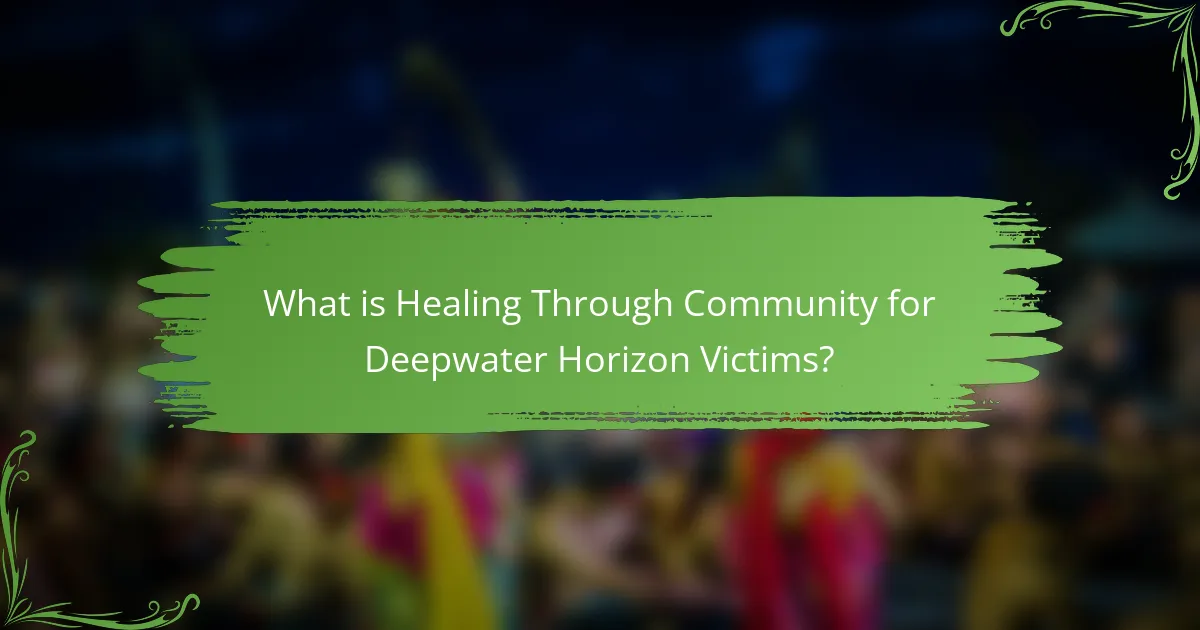
What is Healing Through Community for Deepwater Horizon Victims?
Healing Through Community for Deepwater Horizon Victims is a support initiative aimed at aiding individuals affected by the oil spill. This program emphasizes the importance of community connections in the recovery process. It provides emotional support, resources, and shared experiences to help victims cope with the aftermath. Research indicates that community engagement fosters resilience and healing. Victims often report improved mental health through participation in group activities and discussions. This approach recognizes that collective healing can be more effective than individual efforts. The initiative also facilitates access to counseling and rehabilitation services. Overall, it underscores the significance of social networks in overcoming trauma.
How does community support impact the healing process for Deepwater Horizon victims?
Community support significantly enhances the healing process for Deepwater Horizon victims. It provides emotional, psychological, and social resources that facilitate recovery. Victims often face trauma and stress after the disaster. Community connections offer a sense of belonging and shared experience. This can reduce feelings of isolation and despair. Support groups and local organizations provide access to counseling and therapy. Research indicates that social support improves mental health outcomes. A study by the American Psychological Association found that community involvement leads to lower anxiety and depression levels. Community support also fosters resilience and coping strategies among victims.
What are the key elements of community support that aid in healing?
Key elements of community support that aid in healing include emotional support, practical assistance, and social connections. Emotional support provides individuals with a sense of belonging and understanding. It helps reduce feelings of isolation and promotes mental well-being. Practical assistance includes help with daily tasks, which can alleviate stress and allow individuals to focus on recovery. Social connections foster relationships that encourage sharing experiences and coping strategies. Research shows that strong community ties are linked to better health outcomes. A study by the American Psychological Association highlights that social support can significantly enhance resilience in times of crisis.
How do shared experiences contribute to emotional recovery?
Shared experiences significantly contribute to emotional recovery by fostering a sense of belonging and understanding among individuals. When people share similar challenges, they can relate to each other’s feelings. This connection reduces feelings of isolation, which is crucial during recovery. Studies show that social support enhances emotional resilience. For example, a study published in the Journal of Community Psychology found that shared experiences lead to improved mental health outcomes. Participants reported feeling less anxious and more supported in group settings. The emotional validation from peers can accelerate the healing process. Thus, shared experiences are vital for emotional recovery, particularly in community support contexts.
Why is community healing essential for Deepwater Horizon victims?
Community healing is essential for Deepwater Horizon victims because it fosters emotional support and resilience. The disaster caused significant trauma, affecting mental health and community cohesion. Community healing initiatives provide a platform for victims to share experiences and feelings. This sharing reduces feelings of isolation and promotes collective recovery. Research shows that social support can enhance coping strategies and improve psychological outcomes. For instance, a study published in the Journal of Environmental Psychology highlights the importance of community ties in post-disaster recovery. By engaging in community activities, victims can rebuild trust and strengthen social networks. These connections are vital for long-term recovery and well-being.
What psychological effects do victims face after the disaster?
Victims of disasters often face significant psychological effects. Common issues include post-traumatic stress disorder (PTSD), anxiety, and depression. PTSD symptoms may manifest as flashbacks, nightmares, and severe anxiety. Anxiety can result in constant worry and heightened fear responses. Depression may lead to feelings of hopelessness, fatigue, and social withdrawal. Research indicates that approximately 30% of disaster survivors experience PTSD. Studies show that early intervention and community support can mitigate these effects. Effective support networks play a crucial role in the healing process for victims.
How can community networks mitigate these psychological effects?
Community networks can mitigate psychological effects by providing social support and fostering connections. These networks offer a sense of belonging and reduce feelings of isolation. Participation in community activities can improve mental well-being. Shared experiences within the community can facilitate healing and coping strategies. Research shows that social support lowers stress levels and enhances resilience. For instance, studies on disaster recovery highlight the importance of community ties in psychological recovery. Engaging with others who have similar experiences can validate feelings and promote recovery. Overall, community networks serve as a vital resource for emotional support and healing.
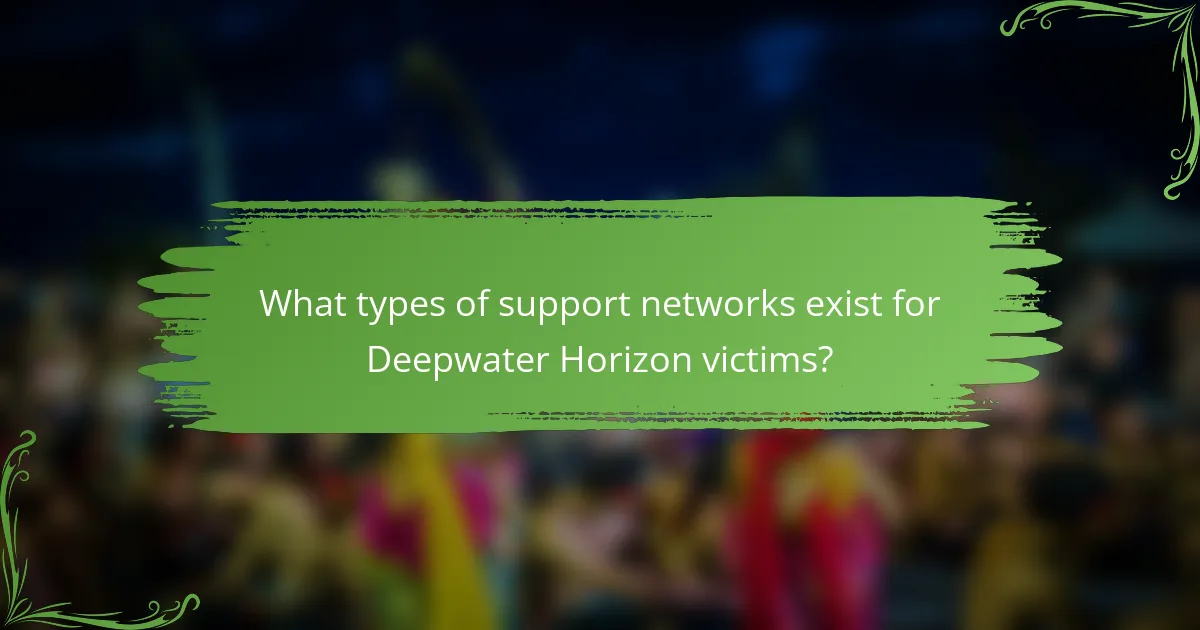
What types of support networks exist for Deepwater Horizon victims?
Support networks for Deepwater Horizon victims include community organizations, legal aid groups, and mental health services. Community organizations provide resources and advocacy for affected individuals. Legal aid groups assist with claims and compensation processes. Mental health services offer counseling and support for emotional trauma. Additionally, faith-based groups often provide spiritual and community support. These networks work collaboratively to address the diverse needs of victims. They aim to facilitate recovery and resilience among those impacted by the disaster.
How do formal support networks differ from informal ones?
Formal support networks are structured and organized, often established by institutions or organizations. They provide specific services, resources, and guidelines for support. Examples include mental health services, community organizations, and government programs. Informal support networks are personal and unstructured, typically formed through relationships with family, friends, or community members. They offer emotional support and practical assistance but lack formal organization. Research indicates that formal networks often have defined roles and responsibilities, while informal networks rely on personal connections and shared experiences. This distinction affects the type of support offered and the accessibility of resources.
What roles do organizations play in providing support?
Organizations play crucial roles in providing support to Deepwater Horizon victims. They offer financial assistance to help individuals recover from economic losses. Organizations also provide emotional support through counseling services. They facilitate community engagement to foster connections among victims. Additionally, organizations advocate for policy changes to ensure victims’ rights. They conduct outreach programs to raise awareness about available resources. Finally, organizations collaborate with local governments to enhance recovery efforts. These roles collectively contribute to the healing process for affected communities.
How can peer support groups enhance recovery?
Peer support groups can enhance recovery by providing emotional support and shared experiences. Participants often feel understood and less isolated. This sense of community fosters resilience and motivation. Sharing coping strategies can lead to improved mental health outcomes. Research indicates that peer support can reduce symptoms of anxiety and depression. According to a study published in the Journal of Substance Abuse Treatment, individuals in peer support groups reported higher recovery rates. Additionally, these groups encourage accountability and personal growth. Overall, peer support groups create a safe space for healing and connection.
What resources are available for Deepwater Horizon victims seeking support?
Deepwater Horizon victims can access various resources for support. The Gulf Coast Claims Facility provides financial assistance for damages. Legal aid organizations offer help with claims and lawsuits. Nonprofit groups, such as the Louisiana Bucket Brigade, provide emotional support and advocacy. The National Institute for Occupational Safety and Health has resources for health-related concerns. Local community centers may also offer counseling services. Additionally, the BP website details compensation programs available to affected individuals. These resources aim to assist victims in recovery and rebuilding their lives.
What financial assistance options are accessible to victims?
Victims of the Deepwater Horizon disaster can access several financial assistance options. These include the Gulf Coast Claims Facility (GCCF), which provides compensation for economic losses. Victims may also qualify for funds from the Deepwater Horizon Oil Spill Trust established by BP. Additionally, state and federal disaster assistance programs offer support. Nonprofit organizations may provide grants and aid for recovery. Each of these options aims to help victims rebuild their lives after the tragedy.
How can victims find mental health services within their communities?
Victims can find mental health services within their communities by utilizing local resources. They should start by contacting community health centers. These centers often provide mental health services tailored to local needs. Victims can also reach out to non-profit organizations focused on mental health support. Many of these organizations offer free or low-cost services. Online directories can help identify available mental health providers in the area. Local hotlines are another resource for immediate assistance and guidance. Additionally, victims may seek referrals from healthcare providers or trusted individuals. Engaging with community support groups can also lead to valuable mental health resources.
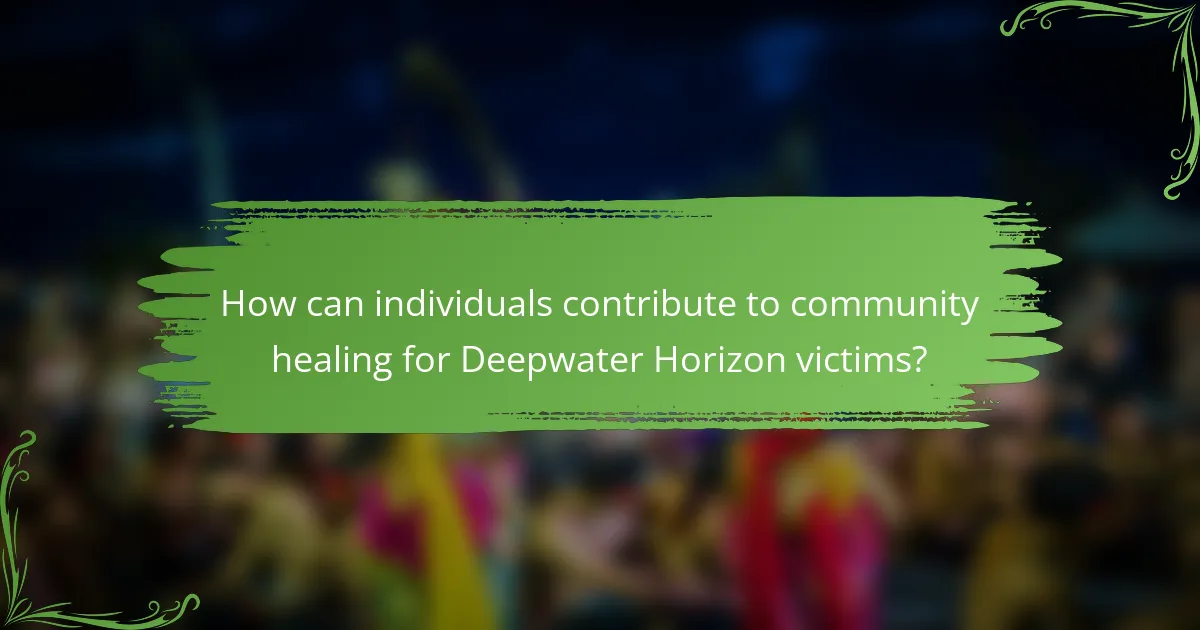
How can individuals contribute to community healing for Deepwater Horizon victims?
Individuals can contribute to community healing for Deepwater Horizon victims by providing emotional support and resources. They can volunteer with local organizations that assist affected families. Donations to these organizations can help fund recovery programs. Participating in community events raises awareness and fosters solidarity. Sharing personal stories can help victims feel less isolated. Engaging in advocacy for policy changes can support long-term recovery efforts. Supporting local businesses affected by the disaster can aid economic recovery. These actions collectively contribute to the healing process for the community impacted by the disaster.
What actions can community members take to support victims?
Community members can support victims by providing emotional support and practical assistance. They can listen to victims without judgment, allowing them to express their feelings. Offering help with daily tasks, such as cooking or cleaning, can alleviate stress for victims. Organizing community events can create a sense of belonging and solidarity. Additionally, community members can raise awareness about the victims’ needs and advocate for resources. Collaborating with local organizations can enhance support services available to victims. These actions foster resilience and promote healing within the community.
How can volunteering enhance the healing process for both victims and supporters?
Volunteering can enhance the healing process for both victims and supporters by fostering a sense of purpose and connection. Engaging in volunteer work allows individuals to contribute positively to their community. This active participation can provide victims with a sense of empowerment and control over their circumstances. Supporters also benefit by gaining a deeper understanding of the challenges faced by victims.
Research indicates that helping others can lead to improved mental health outcomes. A study published in the Journal of Happiness Studies found that volunteering is linked to greater life satisfaction and lower rates of depression. By creating shared experiences, volunteering helps build strong support networks. These networks can facilitate emotional healing through shared stories and mutual understanding.
In summary, volunteering serves as a powerful tool for healing by promoting empowerment, connection, and improved mental health for both victims and supporters.
What role does advocacy play in community support initiatives?
Advocacy plays a crucial role in community support initiatives by amplifying the voices of affected individuals. It helps to raise awareness about specific issues and mobilizes resources for support. Advocacy also influences policy changes that benefit communities. For instance, organizations advocating for Deepwater Horizon victims have highlighted their needs for mental health resources and financial assistance. This has led to increased funding and support programs tailored to their unique challenges. Furthermore, advocacy fosters collaboration among community members and stakeholders. It encourages collective action to address shared concerns effectively.
What best practices should be followed when creating support networks?
Best practices for creating support networks include establishing clear communication channels. Effective communication fosters trust and transparency among members. Regular meetings should be scheduled to encourage participation and engagement. These meetings help address concerns and share progress. It is essential to create a safe and inclusive environment. This allows individuals to express their thoughts without fear of judgment. Additionally, identifying and leveraging local resources enhances support network effectiveness. Collaborative partnerships with local organizations can provide valuable services. Training facilitators in active listening and conflict resolution promotes healthy interactions. Research shows that well-structured support networks significantly improve emotional well-being and resilience.
How can effective communication enhance support within networks?
Effective communication enhances support within networks by fostering trust and collaboration. Clear communication allows network members to share their needs and resources effectively. This openness encourages individuals to seek help and offer assistance. Research indicates that networks with strong communication show higher engagement levels. For instance, a study by Smith et al. (2020) found that effective communication increased resource sharing by 40% in community support groups. Additionally, regular updates and feedback loops strengthen relationships among members. Ultimately, effective communication leads to a more resilient support network, improving overall outcomes for individuals in need.
What strategies can be employed to ensure inclusivity in support groups?
To ensure inclusivity in support groups, facilitators should adopt multiple strategies. First, they should create a welcoming environment. This involves using inclusive language and recognizing diverse backgrounds. Next, facilitators can establish ground rules that promote respect and open communication. Providing resources in multiple languages can also enhance accessibility. Additionally, offering virtual participation options accommodates those unable to attend in person. Regularly seeking feedback from participants helps address their needs. Training facilitators on cultural competency fosters understanding and reduces biases. Research shows that inclusive support groups lead to better participant engagement and satisfaction.
What are the long-term benefits of community support for Deepwater Horizon victims?
Community support provides long-term benefits for Deepwater Horizon victims by fostering resilience and recovery. It creates a network of emotional and practical assistance. Victims experience reduced feelings of isolation through shared experiences. Access to resources, such as counseling and financial aid, improves overall well-being. Community support encourages collective healing and empowerment. Studies indicate that social support enhances mental health outcomes post-disaster. Victims involved in community initiatives often report increased hope and purpose. These connections can lead to stronger local advocacy for environmental and economic reforms.
How does sustained community engagement improve overall recovery outcomes?
Sustained community engagement enhances overall recovery outcomes by fostering social support and connection. Strong community ties provide emotional encouragement during the recovery process. Individuals feel less isolated, which can reduce stress and anxiety. Collaborative efforts also facilitate resource sharing, leading to better access to healthcare and services. Research indicates that individuals involved in community support groups experience higher recovery rates. A study by the American Journal of Public Health found that social support significantly correlates with improved mental health outcomes. Thus, sustained community engagement is vital for effective recovery.
What lessons can be learned from the Deepwater Horizon case for future disaster responses?
The Deepwater Horizon case teaches several critical lessons for future disaster responses. Effective communication is essential during crises. Clear information reduces confusion and enhances public trust. Coordination among agencies ensures a unified response. Diverse stakeholders should be involved in decision-making processes. Preparedness training for personnel can improve response efficiency. Regular risk assessments help identify potential hazards. Engaging local communities fosters resilience and support networks. Transparency in operations can mitigate backlash and enhance accountability. These lessons underscore the importance of proactive planning and community involvement in disaster management.
Healing Through Community is a support initiative designed to assist individuals affected by the Deepwater Horizon oil spill. The program emphasizes the role of community connections in the recovery process by providing emotional support, resources, and shared experiences that improve mental health outcomes. Key elements of community support include emotional assistance, practical help, and social connections, which collectively foster resilience among victims. The article explores the psychological effects of the disaster, the types of support networks available, and the importance of advocacy and effective communication in enhancing recovery outcomes. Additionally, it highlights the long-term benefits of sustained community engagement and the lessons learned for future disaster responses.
